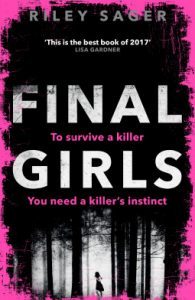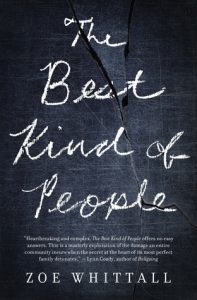Claire Hennessy's Blog, page 10
June 29, 2017
Book Review: Final Girls
Quincy Carpenter leads an ordinary life – sort of. It’s a settlement, and not her job (running a baking blog), that pays for her Manhattan apartment. And aside from her boyfriend Jeff, a public defender, the only other person in her life she trusts is Coop, the cop who saved her on the worst night of her life. Ten years ago, Quincy survived a massacre. She doesn’t want to talk about it, or think about it.
The media, however, won’t let her forget. Quincy and two other women in similar situations have been dubbed the ‘Final Girls’, after the horror movie trope of the girl who survives to tell the tale. Lisa, the oldest of the three, now a child psychologist who’s written a memoir of her experiences, has just been found dead – and Sam, the recluse, turns up on Quincy’s doorstep, worried about what might happen next. Or so she claims.
Neither woman is particularly trustworthy. Quincy’s memory gap is suspicious, and she’s a little too fond of her morning Xanax; Sam is deliberately vague about where she’s been all these years. When new information is revealed about Lisa’s death, it’s clear something very dangerous is going on. Precisely what is only revealed at the end, in a twist that manages to genuinely shock. This is a compulsive stay-up-late-to-finish book.
Final Girls is published on July 11th.
June 22, 2017
Book Review: The Best Kind of People
Shortlisted for the Giller Prize, The Best Kind of People sets out its stall immediately by opening with a quote from Kate Harding’s (excellent) Asking For It, referring to the overwhelming tendency of the average person to – unlike with any other criminal accusation – identify with the accused, rather than the accuser.
George Woodbury is a respectable pillar of the community, a hero within the New England town where he is still remembered as being the teacher who tackled a school shooter several years ago. So when he’s arrested for sexual impropriety, there are plenty of murmurings about whether or not the four teenage girls who’ve made the accusations can be trusted or not.
Good Feminist Ideology says: believe the girls. They don’t lie about this stuff. But when it’s your husband or father accused, insisting that he’s been set up . . . who do you believe? (Cue dramatic music.)
Joan, the dependable wife, attends a support group for wives and mothers of sexual offenders (these really exist, and partially inspired the novel) and wonders whether she really belongs there. Andrew, the gay son who escaped the stifling small-town vibe as soon as he could, resents being back there to support his family. And Sadie, the precocious teenage daughter, moves into her boyfriend’s house and strikes up a friendship with an older writer looking for inspiration for his new novel.
All the while, there’s a men’s rights group determined to shout down the girls and insist that ‘regret is not rape’ – an attitude that the author can’t quite avoid condemning within the text. (One Goodreads review despairs over the ‘aggressively progressive’ politics of the novel. On balance, though, having characters eye-roll over misogynist propaganda doesn’t quite spoil a book for me.)
This is a deeply sympathetic book, one that looks at the aftermath for those closest to a man accused of sexual violence – and in doing so reminds us of how common, how normal, such violence is. There are no easy resolutions – and the final line is heart-breaking – but in a way that makes it all the more compelling. Without spoiling too much, it has an ending that sums up just how insidious rape culture is.
Political, yes, absolutely. But each of the three central characters is engaging and well-drawn, and Whittall has written a story rather than a situation, a novel rather than a treatise. Originally published in Canada last year, The Best Kind of People will be available in Ireland and the UK in July.
June 15, 2017
Book Review: A Summer To Die
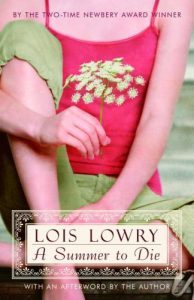
There’s something very strange about reading Lois Lowry’s seminal teen novel forty years after it was first published. Even though I hadn’t actually read it (despite loving her other books) until now, I had picked up on various details via cultural osmosis – the older sister Molly who dies being the main one, of course, and then younger sister and narrator Meg’s learning to deal with this, helped by her newfound expression in photography.
But there’s much more than that in this, like the young couple Meg befriends who are shunned by many because they seem to be unmarried (in fact, the woman has simply kept her own name), or the strangeness for Meg of moving to this new house while her professor father completes his book.
And it seems a strange mix of very adult – some of the scenes with the pregnancy/delivery, for example – and very naïve – it is very clear to the reader that Molly is not well, even though Meg doesn’t seem to see it. There’s a distance here that feels odd for a work for young readers, as well as a historical distance that makes it feel very much from a different time (which of course 1977 is, but still).
I liked it very much but my heart belongs to Anastasia Krupnik or Natalie of Find A Stranger, Say Goodbye.
June 8, 2017
Book Review: The Roanoke Girls
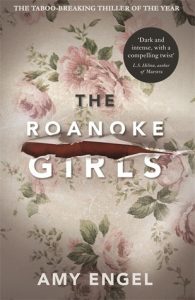
Lane only spent one summer at the family estate, Roanoke, after her mother’s suicide – and then only because at not-yet-sixteen she wasn’t able to live on her own, much as she wanted to. Back then, her teenage cousin Allegra introduced her to the world of the Roanoke girls – their grandfather’s sisters, daughters, nieces, grandchildren, all with eerily-similar portraits and all of whom either run or die.
Lane ran. But now, more than a decade later, Allegra’s gone missing, and Lane returns to find her. Even as she acknowledges her sheepishness at playing amateur detective, she also knows that no one else understands just quite how sinister Roanoke is. Just quite how much her grandfather loved Allegra – his favourite – and how he showed that love. Just quite how much Allegra, like the other Roanoke girls before her, loved him back.
This is both a compelling thriller and a disturbing insight into incest, particularly the rivalries between the ‘girls’ over the affection of their older male relative. Even as Lane is relieved to have not been targeted the way Alexa was, she also asks: why not her? It’s a painful and authentic thread running through this quasi-gothic mystery.
June 5, 2017
One Bad Turn blog tour: interview with Sinead Crowley
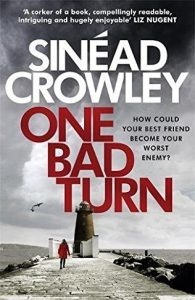
The third novel in Sinead Crowley’s series about D.S. Claire Boyle begins with a bang. Claire is at her doctor, for reasons we won’t know until later, when a crazed woman arrives with a gun. As events unfold, we learn that the woman has a history with the doctor, and that a dead child is involved – something which is difficult for Claire to fully take on board, given that her own baby is on the other side of a set of very thin walls.
This is a gripping and immersive psychological thriller that impressively balances the ongoing concerns of the regular characters with the dilemmas of the new, and one that insists you keep turning the pages. I absolutely adored reading this book – it is smart, insightful and engaging. Very much looking forward to the next installment in this impressive series.
*
And I’m delighted to be able to interview Sinead as part of her blog tour for the new book!
One Bad Turn is the third book featuring D.S. Claire Boyle – does it get easier or harder to write the novels as you go along (confidence that you can finish vs pressure to maintain quality, etc)?
I wouldn’t say easier, exactly but I enjoyed writing ‘One Bad Turn’ more than the other two. There is a sense on book three that you have some clue about what you are doing! You are aware you finished a book before and therefore you’re reasonably sure you will get through this one too. Also, I’m very fond of Claire Boyle and am eager to see where her journey takes her so I was very happy to return to her story.
This book does a magnificent job of balancing the ongoing storylines of the police officers involved with being accessible to new readers – how did you find this balance?
Thank you very much! One of my favourite things about crime fiction is the series element, watching the central characters develop alongside the individual plots so I’m delighted you felt I achieved that. One of the things that helped this time was making Claire a witness to the action as well as the investigator, it meant I could introduce her back story naturally, particularly since her baby was involved as well.
The portrayal of teenage girls, both in the past and in the present, is really astute – what was the research like for this?
Again, thank you for that. The ‘research’ for the flashback chapters wasn’t too hard as they were based on my own experiences, for example buying Doc Martens at the back of the ILAC centre, and going to our local rugby club disco. Getting the voice of the contemporary teenager was more difficult but I used social media and YA fiction as research. At one stage I also texted my fellow author Louise O’Neill to find out what phrase people use for ‘kissing’ now! Turns out, a lot of the time it’s just kissing….
What’s your research process like generally? Do you talk to real detectives etc and at what stage of the writing process does it happen?
I have to admit that I retrospectively research, I tend to write the book first and then fill in the gaps, finding out afterwards if something ‘could happen’ and changing it if I’ve gone badly wrong. I’ve been working as a journalist for 20 years, so even though I don’t work in the area of crime I have a reasonable knowledge of police procedure and my husband is a courts reporter so he’s very helpful too. But to be honest, I know some of the events in the book probably wouldn’t happen that way in real life but that’s the joy of fiction – you get to make things up! As long as the reader believes in the story and isn’t pulled out of it by something completely implausible then I’m happy.
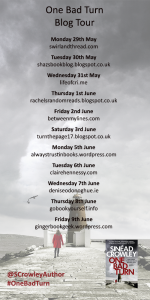
Click to enlarge and see where Sinead will be appearing online next…
The fictionalised Dalkey/Killiney area in the novel is rendered beautifully – what drew you to this setting?
It’s just such a gorgeous part of the world, isn’t it? I don’t live anywhere near there but we often go walking out that direction on weekends and I love it very much. I also like the idea of it being a self-contained area, it suited the plot for ‘Fernwood’ to have that village atmosphere but to also be close enough to Dublin for Claire to be able to investigate. I took a lot of liberties with geography – that’s why I gave it a different name, I didn’t want someone from the area to say ‘oh you can’t walk to the hill from there’ or something because again I didn’t want to drag them out of the story. But I did have an interesting walk up Killiney Hill one day with a friend who lives locally, and I hope no one was listening as we discussed the best place to set a particular pivotal death scene!
What’s the editorial process like for you – who sees your first draft? Do you do detailed outlines before writing?
No, I don’t really outline at all, at least not more than a chapter or two ahead. I tend to start each book with an image and work from there. In the case of ‘One Bad Turn’ I was thinking about two women, facing each other in a confined space. I knew they used to be friends and that one now hated the other, and it then was my job to work out why. I knew, roughly how the story would end but I had no idea, when I started writing how to get there. I prefer to work like that. I don’t really have a rough draft either – I tend to work on each chapter, over and over again until I’m happy, so by the time I get to the end I have what I’d call a reasonable working draft rather than a first one.
The social commentary in the novel is very sharp – I particularly love the observation about how the marriage equality referendum prompted same-sex couples to deal with the ‘marriage issue’, which actually came up at a recent panel I was part of. Do you worry that this might ‘date’ the novel, or is it more important to authentically represent a particular time and place?
As the novel deals with the repercussions of the financial crash, it was always going to be set in a particular time period, so I wasn’t worried about mentioning the marriage referendum. Philip Flynn, the character you are talking about, is probably my favourite person to write. He happens to be gay but he’s also many other things – a transplanted culchie, a good cop, a great friend – so I was having a bit of fun with him in that section too! The other point about the Claire Boyle books is that her baby is a big part of the plot, so I have to be careful to keep the timeline accurate. The books will age as the baby ages, in real time.
Claire’s husband has had issues with her dedication to her work from the beginning of the series. She’s a devoted mother but at the same time it never seems to be enough. Do you think women today still face the ‘choice’ between being brilliant at their job and being a ‘good mother’?
I’m glad you pointed out that it’s her husband has the issues! Claire is fine – she’s not guilty about doing both. She is a great mother and a great cop and feels she can do both but she doesn’t have the support at home to make that easy. I know lots of women who do both but they have to have good back up, either from family or paid help or both. So no, I don’t believe you have to choose one over the other but you do need support and she unfortunately doesn’t have it. Matt said, before they had children that he would be the main parent in the home but it didn’t work out the way he envisaged it.
If you’re allowed to say, what are you working on next?
I’m in the very early stages of a new book but what I can say is that I’m moving the action outside of Dublin, to the south west of Ireland. Think small villages, a country house, the valley of the squinting windows – and a stranger in town!
And finally, which authors – both crime/psychological thriller and others – do you admire? What have you read recently that’s impressed you?
There are so many. To list just a small number, Erin Kelly, Jane Casey, Alex Marwood are consistently good. Liz Nugent is a terrific author and her books are genuinely unique. I also recently read a reissued book from the 1950s called The Hours Before Dawn by Celia Fremlin which is as fine an example of psychological fiction as you’ll find.
In the non crime genre recent books by Molly McCluskey and Min Jin Lee will definitely be on my best of 2017 list too.
Thanks so much to Sinead for these great answers and to Alainna at Quercus! You can follow Sinead on the twitter machine here and order One Bad Turn here.
June 1, 2017
Book Review: Sometimes I Lie
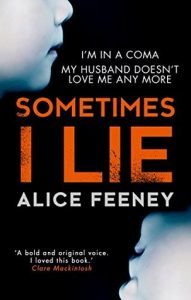
Amber is in a coma. Her husband Paul and sister Claire watch over her as she flashes back and forth between the now – an unseeing witness to their anxious conversations about what has happened to her and whether she’ll ever wake up – and the then, the week or so leading up to the accident that’s left her unconscious.
As the narrative progresses we grow increasingly more suspicious of Paul – isn’t the husband always to blame, after all? – and Claire, as well as garnering insights into Amber’s childhood from diary entries. At the same time, as Amber constantly reminds us: sometimes she lies. And the truth we are getting is far from it.
This is an enjoyable, twisty, dark tale of obsession and a fine debut from journalist and producer Alice Feeney.
May 30, 2017
Shiny!
Bookish updates
I’m over on instagram a lot these days, mainly taking pictures of books (one-track mind).
And some recent pieces for The Irish Times – an interview with Peadar Ó Guilín (The Call); an interview with David Owen (The Fallen Children); reviews of the new YA titles for May, and a look at the new Anne of Green Gables covers to mark the release of the new adaptation.
May 25, 2017
Book Review: Frog Music
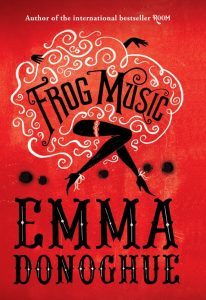
There is sex, glamour, grit and murder in Emma Donoghue’s historical novel, with 1870s San Francisco brought vividly to life with the same kind of attention to detail she exhibits in The Sealed Letter, The Wonder or Life Mask. You’re right there, amidst the suffocating heat and the wave of cholera travelling the city. And amidst the bohemian types with their curious menage-a-trois set-up, with burlesque dancer Blanche and two men that are clearly together but also willing to sleep with Blanche when it is necessary – and Donoghue never shies away from the sex.
When Blanche befriends the cross-dressing Jenny (and Donoghue has done her homework on precisely how one should read this individual), a woman who’s been arrested several times for dressing in inappropriate attire and who is immediately charismatic, she does not know how quickly this friendship will be torn apart by a bullet, and how quickly she will turn from Jenny’s friend to the woman trying to untangle a murder – and trying to track down her own child in the process.
A thoroughly enjoyable, immersive read.
May 18, 2017
Book Review: Conversations With Friends
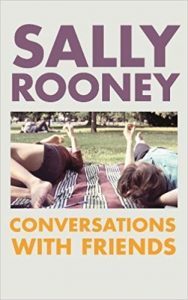
I really loved this book. I’m trying to think of sharp, clever things to say about it that will make Frances, the very clever twenty-one-year-old narrator of the novel, like me and be impressed with me, insofar as she is impressed with anyone (oh and yet she is sometimes, but not in nearly as idealistic or naïve way as one might expect from a twenty-one-year-old).
Frances and Bobbi had a schoolgirl fling and are now in college, performing poetry around Dublin’s arts/literary scene (a setting that is handled lightly, rather than being weighed down by too many references to the writers one should know) and gaining the attention of essayist and photographer Melissa, and later her husband Nick. These are the four ‘friends’ of the title and the friendships, of course, get complicated – not least when Frances and Nick begin an affair.
Press releases have paid much attention to the use of messaging and email in this book but actually there is very little of it, yet what there is always rings true. The voices are very real, and the topics touched on – from the high-brow academic politics to the everyday intimacies, by way of class difference – are handled skilfully but are never over-the-top.
And while I recognise that this is a very smart book, my love for it is emotional; I lapped it up eagerly and kept thinking about it after I’d finished. There is so much in here, ranging from tiny precise moments that capture something so beautifully to larger themes handled most pleasingly, that I just completely adored.
Conversations with Friends is published by Faber & Faber on June 1st.

